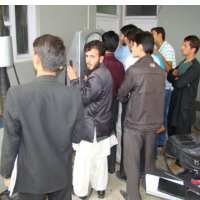Why are Companies that Support Anti-American Terrorism Given Pentagon Contracts in Afghanistan?
 Interns at Zurmat Material Testing Laboratory (photo: U.S. Army)
Interns at Zurmat Material Testing Laboratory (photo: U.S. Army)
The United States has paid more than $150 million to local contractors in Afghanistan who have allegedly helped in terrorist attacks on American soldiers and posts, according to an “alert letter” from the Special Inspector General for Afghanistan Reconstruction (SIGAR) to Secretary of Defense Chuck Hagel. Although shocking, the allegations are reminiscent of the fact that several large U.S. corporations worked for the Nazi regime during World War II.
SIGAR’s John Sopko wrote that his investigation into the unfinished Parwan Justice Center construction project revealed that Zurmat Material Testing Laboratory (ZMTL) performed subcontract work in November 2012 despite being on the Commerce Department’s Entity List of national security threats thought to be involved in “supply networks that provide components used to make improvised explosive devices (IEDs) used against U.S. and coalition troops in Afghanistan.”
ZMTL is not the only Afghan contractor thought to be playing both sides of the war. In fact, Sopko estimates that over the past five years more than $150 million in contracts and subcontracts has gone to companies and individuals accused of assisting terrorist groups. Another local contractor, Haji Khalil Zadran, is likely to win an $11 million deal to build an airport in Khost, despite accusations that he has funneled millions of dollars in U.S. funds to the Haqqani network, which was blamed for a 2011 attack on the U.S. Embassy in Kabul that killed 16 people.
Afghan terrorist groups being on the U.S. payroll has been a problem for a while. Although the U.S. policy of relying on Afghan contractors was meant to save money and create local goodwill, both official corruption and the payment of funds to U.S. enemies have resulted. Congress’s attempt to fix the contracting problem by passing Section 841 of the Fiscal Year 2012 National Defense Authorization Act, which requires the Pentagon to review contractors to determine which side they are really on and to restrict, terminate, or void the contracts of those found to be disloyal.
Because Section 841 applies only to DoD, Sopko compiled a list last year of 43 companies and individuals, including ZMTL, identified as affiliated with terror groups who were either seeking or had U.S. contracts in Afghanistan. But earlier this year, the Army rejected all of Sopko’s 43 referrals, claiming it would be unfair to ban them from contracting based on classified evidence that cannot be shown to the accused.
Describing what he called “the absurdity” of the Army’s newfound respect for due process, Sopko pointed out the contrast to how the U.S. is waging the war: “We can probably attack them via drone on Monday and we’ll issue them a contract on Tuesday.”
In other words, the same military that insists that the detainees at Guantánamo Bay, Cuba, who have been imprisoned, tortured, force-fed and otherwise abused for more than ten years on the basis of classified information without being charged or tried, are receiving all the due process required by law, argues that preventing a company from getting a contract based on classified data is such an egregious violation of due process as to be dismissed out of hand.
Perhaps the day has finally come when companies really do have more and better rights than actual individual human beings.
-Matt Bewig
To Learn More:
Company Linked to Terrorism Gets U.S. Contract Work (by Neil Gordon, POGO Blog)
Senator: US Soldiers Being Killed by Terror Groups Backed With US Money (by Brian Ross, Rhonda Schwartz, and Megan Chuchmach, ABC News)
SIGAR Alert (by John F. Sopko) (pdf)
U.S. to Lose Oversight of Afghanistan Reconstruction Projects worth Billions (by Noel Brinkerhoff and Danny Biederman, AllGov)
- Top Stories
- Unusual News
- Where is the Money Going?
- Controversies
- U.S. and the World
- Appointments and Resignations
- Latest News
- Musk and Trump Fire Members of Congress
- Trump Calls for Violent Street Demonstrations Against Himself
- Trump Changes Name of Republican Party
- The 2024 Election By the Numbers
- Bashar al-Assad—The Fall of a Rabid AntiSemite






Comments